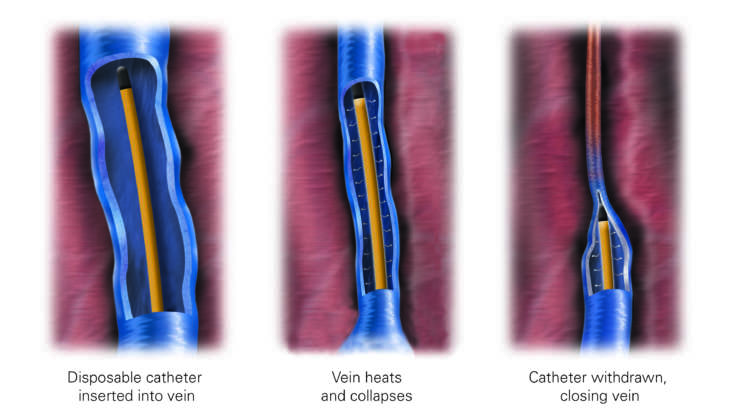Radiofrequency Ablation (RFA)
RFA is a minimally invasive procedure which is performed in our office to treat venous disease. It is also called the Venefit™ Procedure.
What happens during the RFA procedure?
During the procedure, heat energy is used to shut down your bad veins. A catheter is placed into the diseased vein, through a small incision in the skin. Your leg is then numbed with a local anesthetic. The catheter delivers radiofrequency (RF) energy to the vein, providing enough heat to damage the vein walls. This causes them to collapse and seal the vein. Once the vein is closed, your body redirects the blood to the remaining healthy veins.

Often, other procedures such as Ultrasound Guided Foam Sclerotherapy (USGS) or Microphlebectomy are performed at the same time as the RFA procedure.
What should I expect after the RFA procedure?
After the procedure, a compression stocking will be placed on your leg. You will wear that stocking for most of the next week. You wear it around the clock for the first 3 days, then you wear it during the day and take it off at night for the next 4 days.
You should avoid strenuous activity for a week after each procedure. We advise you not to lift anything heavier than 20 lbs for that week. We do want you to be active though. We advise frequent low impact activity, like walking, starting on the day of the procedure.
Some post-procedure bruising is expected. Any discomfort is typically managed with over the counter pain medications. The bruising and discomfort usually resolve quickly.
The RFA procedure allows for effective treatment of your vein issues with a comfortable recovery and a prompt return to everyday activities.
Why do you offer both RFA and EVLT procedures?
RFA and EVLT procedures both use heat to treat the unhealthy veins in your legs. Despite sounding similar, there are differences between the two procedures. By offering both procedures, we are able to treat a wider variety of vein problems than we would if we just offered either RFA or EVLT. To us, it’s worth the extra effort to take better care of our patients. The decision of which procedure is best for you will be made by your physician, based upon your ultrasound and physical examination findings.
